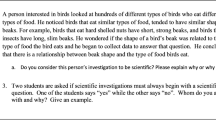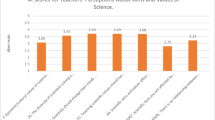Abstract
The ability to do inquiry does not necessarily translate to understandings about scientific inquiry or the processes by which scientific knowledge is generated. The study reported in this paper focuses on what students know about scientific inquiry and what impact school science may have on this knowledge. We investigated grade 12 physical and life sciences students’ understandings about eight core aspects of the nature of scientific inquiry (NOSI) at a diversity of high schools in South Africa. Data were collected in two phases. In phase 1, the Views About Scientific Inquiry (VASI) questionnaire was administered to 203 grade 12 students from six schools across different socio-economic spectra (township, former model c and independent schools). Phase 2 constituted follow-up semi-structured interviews with 20% of the questionnaire respondents (n = 41). The findings revealed that grade 12 students held mostly naïve and mixed understandings about the NOSI. Though observed differences indicated that students at elite independent schools held more informed views than students at suburban and township schools, chi-square test of association (X2) for different school types showed a statistically significant difference in students’ understandings only for one NOSI aspect. This finding was regarded as being insignificant to make claims of differences in students’ NOSI understandings for the different school types. The implications of these findings and future directions for research are also discussed.

Similar content being viewed by others
References
Abd-El-Khalick, F., Boujaoude, S., Duschl, R., Lederman, N. G., Mamlok-Naaman, R., Hofstein, A.,… Tuan, H. L. (2004). Inquiry in science education: International perspectives. Science Education, 88(3), 397–419. https://doi.org/10.1002/sce.10118
American Association for the Advancement of Science [AAAS]. (1993). Benchmarks for science literacy. Oxford University Press
Antink-Meyer, A., Bartos, S., Lederman, J. S., & Lederman, N. G. (2016). Using science camps to develop understandings about science inquiry-Taiwanese students in a US summer camp. International Journal of Science and Mathematics Education, 14(1), 29–53.
Bantwini, B. (2017). Analysis of teaching and learning of natural sciences and technology in selected Eastern Cape Province primary schools. South Africa. Journal of Education, 67, 39–63.
Baykara, H., Yakar, Z., & Liu, S.-Y. (2018). Preservice science teachers’ views about scientific inquiry. European Journal of Education Studies, 4(10), 128–143. https://doi.org/10.5281/zenodo.1311801
Bruner, J. S. (1961). The act of discovery. Harvard Educational Review, 31(1), 21–32.
Crawford, B. (2014). From inquiry to scientific practices in the science classroom. In N. Lederman & S. Abell (Eds.), Handbook of research on science education (Vol. II, pp. 515–544). Taylor and Francis Group.
Creswell, J. W., & Creswell, J. D. (2018). Research design: Qualitative, quantitative, & mixed methods approaches (5th ed.). SAGE.
Chua, J. C., Tan, A. -K., & Ramnarain, U. (2019). Representation of NOS aspects across chapters in Singapore grade 9 and 10 biology textbooks: Insights for improving NOS representation. Research in Science & Technological Education, 37(3), 259–278.
Department of Basic Education. (2011). Curriculum and assessment policy statement: Grades 10–12 physical sciences. Government Printer
Dudu, W. T. (2014). Exploring South African high school teachers’ conceptions of the nature of scientific inquiry: A case study. South African Journal of Education, 34(1), 1–19.
European Commission. (2007). Science education now: A renewed pedagogy for the future of Europe. European Commission
Gaigher, E., Lederman, N., & Lederman, J. (2014). Knowledge about inquiry: A study in South African high schools. International Journal of Science Education, 36(18), 3125–3147.
Govender, N., & Zulu, D. (2017). Natural sciences junior high school teachers’ understanding of the nature of science and its impact on their planning of lessons. Journal of Baltic Science Education, 16(3), 366–378.
Gyllenpalm, J., & Wickman, P.-O. (2011). “Experiments” and the inquiry emphasis conflation in science teacher education. Science Education, 95(5), 908–926. https://doi.org/10.1002/sce.20446
Gyllenpalma, J., Rundgren, C., Lederman, J., & Lederman, N. (2021). Views about scientific inquiry: A study of students’ understanding of scientific inquiry in grade 7 and 12 in Sweden. Scandinavian Journal of Educational Research. https://doi.org/10.1080/00313831.2020.1869080
Harlen, W. (2014). Helping children’s development of inquiry skills. Inquiry in Primary Science Education (IPSE), 1, 5–19.
Leblebicioglu, G., Metin, D., Capkinoglu, E., Cetin, P. S., ErogluDogan, E., & Schwartz, R. (2017). Changes in students’ views about nature of scientific inquiry at a science camp. Science and Education, 26(7–9), 889–917.
Leblebicioğlu, G., Çapkınoğlu, E., Metin Peten, D., & Schwartz, R. S. (2020). Views of nature of scientific inquiry of students in different high schools. Education and Science, 45(20), 143–165.
Lederman, J. S., Lederman, N. G., Bartos, S. A., Bartels, S. L., Antink, A., & Schwartz, R. S. (2014). Meaningful assessment of learners’ understanding about scientific inquiry – The views about scientific inquiry (VASI) questionnaire. Journal of Research in Science Teaching, 51(1), 65–83.
Lederman. J., Lederman, N., Bartels, S., Jimenez, J., Akubo, M., Aly, S., … Voitle, F. (2019). An international collaborative investigation of beginning seventh grade students’ understandings of scientific inquiry: Establishing a baseline. Journal of Research in Science Teaching, 56(10), 486-515
Lederman et al (2021). **Full details omitted as authors are part of the publication.
Mayring P (2014) Qualitative content analysis: Theoretical foundation, basic procedures and software solution. Klagenfurt: Monograph. Available at: http://nbnresolving. de/urn:nbn:de:0168-ssoar-395173.
Merriam, S. B. (1998). Qualitative research and case study applications in education. Jossey-Bass.
National Research Council. (2000). Inquiry and the national science education standards. National Academy Press.
National Research Council. (2012). A framework for K-12 science education: Practices, crosscutting concepts and core ideas. National Academy Press.
NGSS Lead States. (2013). Next Generation Science Standards: For states, by states (vol. 1, The Standards). The National Academies Press.
Osborne, J. (2014). Teaching scientific practices: Meeting the challenge of change. Journal of Science Teacher Education, 25(2), 177–196.
Pallant, J. (2010). SPSS survival manual: A step-by-step guide to data analysis using SPSS. Open University Press/McGraw-Hill.
Ramnarain, U. (2016). Understanding the influence of intrinsic and extrinsic factors on inquiry-based science education at township schools in South Africa. Journal of Research in Science Teaching, 53(4), 598–619. https://doi.org/10.1002/tea.21315
Ramnarain, U., & Hobden, P. (2015). Shifting South African learners towards greater autonomy in scientific investigations. Journal of Curriculum Studies, 47(1), 94–121.
Ramnarain, U., & Schuster, D. (2014). The pedagogical orientations of South African physical sciences teachers toward inquiry or direct instructional approaches. Research in Science Education, 44(4), 627–650.
Sadler, T. D., Barab, S. A., & Scott, B. (2007). What do students gain by engaging in socio-scientific inquiry?. Research in Science Education, 37, 371–391.
Schwartz, R. S., Lederman, N. G., & Lederman, J. S. (2008). An instrument to assess views of scientific inquiry: The VOSI questionnaire. Paper presented at the international conference of the National Association for Research in Science Teaching (NARST)
Senler, B. (2015). Middle school students’ views of scientific inquiry: An international comparative study. Science Education International, 26(2), 166–179.
Stott, A. & Hattingh, A. (2020). Pre-service teachers’ views about the nature of science and scientific inquiry: The South African case. South African Journal of Education, 40 (1)
Wiblom, J., Andrée, M., & Rundgren, C.-J. (2020). Navigating alarming media messages about nutrition and health: How students engage in critical examination of science in news media. Science & Education. https://doi.org/10.1007/s11191-019-00099-1
Yang, I.-H., Park, S., Shin, J., & Lim, S. (2017). Exploring Korean middle school students’ view about scientific inquiry. EURASIA Journal of Mathematics Science and Technology Education., 13(7), 3935–3958.
Acknowledgements
We wish to acknowledge and appreciate the National Research Foundation (NRF) and the Global Excellence Stature (GES) for funding this project.
Author information
Authors and Affiliations
Corresponding author
Ethics declarations
Conflict of Interest
The authors declare that they have no conflict of interest.
Additional information
Publisher’s Note
Springer Nature remains neutral with regard to jurisdictional claims in published maps and institutional affiliations.
Rights and permissions
About this article
Cite this article
Penn, M., Ramnarain, U. South African Grade 12 Science Students’ Understandings of Scientific Inquiry. Sci & Educ 31, 635–656 (2022). https://doi.org/10.1007/s11191-021-00259-2
Accepted:
Published:
Issue Date:
DOI: https://doi.org/10.1007/s11191-021-00259-2




